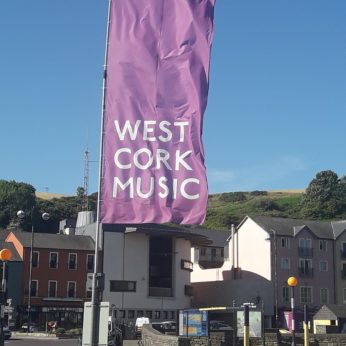Composer: Joseph Haydn (b. 1732 - d. 1809)
Performance date: 05/07/2009
Venue: Bantry Library
Composition Year: 1772
Duration: 00:22:23
Recording Engineer: Anton Timoney, RTÉ lyric fm
Instrumentation: 2vn, va, vc
Instrumentation Category:String Quartet
Artists:
David McCann -
[cello]
Aiveen Gallagher -
[viola]
Michael Trainor -
[violin]
Roisin Walters -
[violin]

In
order to make as much money as possible from the sale of each new set
of six quartets, Haydn used to send them to several different
publishers but in
a different order each time so they would not be immediately
identifiable from catalogue listings. In the case of Op.20 there are
no less than four different orders with the C major appearing twice
as No.3 and once each as Nos.5 and 2, providing material for much
scholarly debate.
Opus
20 is generally considered a critical point in Haydn’s development
of the string quartet. Tovey went so far as to state: With
Op.20 the historical development of Haydn’s quartets reaches its
goal; and further progress is not progress in any historical sense
but simply the difference between one masterpiece and the next. This
set was composed shortly after the two sets of Op.9 and Op.17 and
when he came to his third set in four years he had a particular
problem to solve, namely the need to increase the weight of the
finale to offset the earlier dominance of the first movement. He
tackled this head-on by including three fugal finales so that their
complexity of thought immediately altered the internal balance of the
quartet.
The
other most noticeable change in these quartets is that the monarch
has been deposed and democracy installed in a bloodless revolution.
Whereas the first violin had ruled almost unopposed over long
stretches of the earlier quartets, Haydn now cultivates the spirit of
give and take that lies at the heart of the classical string quartet,
each player receiving a vital and distinct identity. The C major
Quartet underlines this new democracy by opening with a string trio
led by the second violin, followed by a thoroughly unconventional
trio with the two violins and the viola as bass. This is a glorious
movement where the four voices revel in this new-found equality.
The
Capriccio
is
neither more nor less than an operatic scena, beginning with a
recitative where cello and first violin in turn plead with an
implacable orchestra, so vivid is the impersonation you can almost
hear the singers. The tension is eased somewhat when the first violin
takes off in a heart-easing cantabile
aria, but the mood remains unsettled until the ethereal minuet
provides resolution. The finale is a riot, the four subject fugue
wears its learning lightly, exploiting the opportunity for witty
banter. After several pages of this light-hearted, softly spoken
conversation the music erupts into an assertive forte
that brings the movement to a fine conclusion.
Copyright © 2025 West Cork Music. All rights reserved.
Designed and developed by Matrix Internet